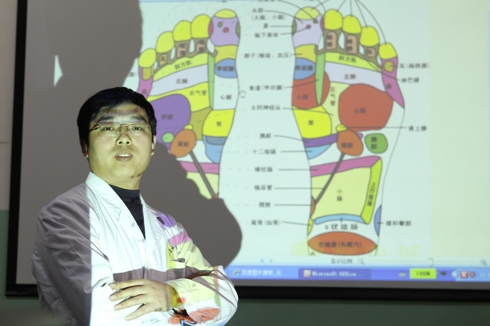Focus
Jury's still out for a massage that calms more than the sole
By Yang Wanli and Cui Haipei (China Daily)
Updated: 2010-04-22 10:46
 |
Large Medium Small |
|
 Dr Zhu Qingwen says pressing on reflex points on the feet can help treat problems like dizziness, hypertension and even toothache, but its effectiveness hasn't been proven scientifically. [Wang Jing / China Daily] |
With foot rubbing businesses growing rapidly, many staff have been given only short-term training
Foot massage stands firm as a popular relaxation choice for white-collar workers in Beijing, largely due to the traditional Chinese idea that it can cure certain diseases.
But how often does this miracle occur at the tens of thousands of foot massage salons across the city?
Some doctors have revealed recently that foot massage is a form of personal hygiene and not medical treatment. Professional foot care in hospitals has been suggested as an alternative.
"Foot massage can accelerate blood circulation and metabolic rate. In turn, it helps cure problems with tendons and bones, as well as relax the body and mind," said Liu Yanbao, general director of Chinese Acupuncture Institute.
"In Chinese foot massage theory, each reflex point on the sole of the foot corresponds to an internal organ. However, this is a theory that hasn't been proven scientifically."
Traditionally, foot massage begins with the soaking of feet in a wooden barrel containing herbs. After that, a masseur or masseuse applies a thick layer of lotion on the feet and calves, and rubs and kneads every point of the soles.
"Practitioners of traditional Chinese medicine believe there are 62 reflex points on the soles of the feet that correspond to different parts of the body," said Chen Hong, vice-director of Beijing Traditional Chinese Medicine University's Human Function Department.
Chen said feet are an important, although often ignored, part of the body. She believed applying pressure on those points could reduce "harmful matter" and improve prevention against illness.
The benefits of foot massage are widely appreciated among the older generations of local Chinese.
Statistics from China General Chamber of Commerce Bath Commission, taken at the end of last year, show there were more than 165,000 foot and body massage businesses in China, which include spas and bathing houses, with more than 16.5 million employees.
Liang Zunxiao, 28, graduated last year in Chinese Massage from the Beijing University of Chinese Medicine. He plans to open a foot massage center.
"I'm confident in the market. I have been to some foot massage centers in Beijing for research. A foot massage usually costs between 100 and 150 yuan," he said.
"However, I found that most workers had poor knowledge of reflex points. They didn't know that unprofessional treatment could cause soft tissue injuries."
According to the China Foot Massage Commission, less than 5 percent of foot masseurs are properly certified.
"I trust Chinese medicine, but I doubt foot masseurs when they say they can cure illnesses," said a 58-year-old citizen surnamed Yang from Chaoyang district.
The Health Ministry released a notice in September 2005 that said traditional medical treatment should only be available in hospitals. Health clubs, such as foot and body massage centers, should not offer therapeutic treatment.
But this hasn't slowed a growing public trust of the technique.
"The market has risen rapidly over recent years. In order to employ more staff, many centers only provide newcomers with short-time training. This unprofessional attitude can seriously hurt customers," said Yang Mingming, director of the commission.
She said customers might suffer from a shortness of breath due to rapid beating of the heart, caused by improper pressure on reflex points. She added that foot massage can even rupture capillaries.
Zhu Qingwen, deputy secretary-general with the Institute of Traditional Chinese Medicine External Treatment Branch, said the pressing of reflex points should be promoted.
"I often apply pressure to a point on the foot to treat problems like dizziness, hypertension and even toothache. Practice has shown it helps, but it hasn't been proven scientifically," he said.
He said that foot medication is not a remedy for all illnesses. Zhu suggests ordinary people see a doctor if they become ill and only use foot massages as a form of general health care.
A 40-year-old foot massage lover, surnamed Wan, said foot massage does relieve his fatigue.
"It feels good and they provide a good environment. But if I get sick, I will still opt for a hospital rather than a massage center," he said.
Wang Jiansheng, Qinghuachi's most-acclaimed foot specialist, is warning anyone expecting foot massage to cure diseases such as ringworm of the foot, leuconychia and flatfoot, to tread cautiously.
"Foot diseases are common because people wear high-heels and badly-made shoes now," said Wang.
Qinghuachi, one of Beijing's oldest bathhouses - built in the 1900s - has more than 700 customers every day.
Wang said foot massage can help aid blood circulation, which will contribute to good health.









